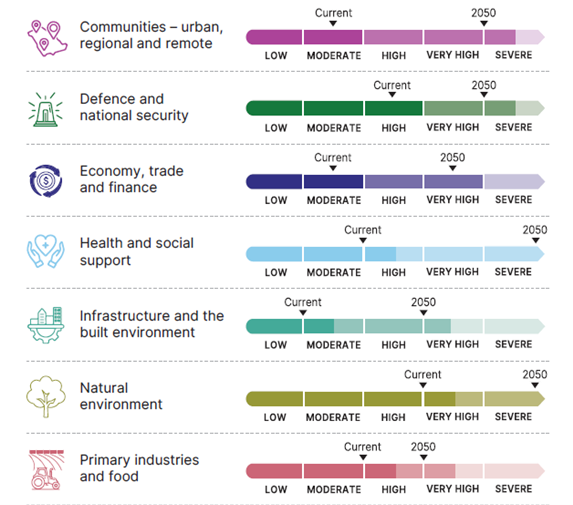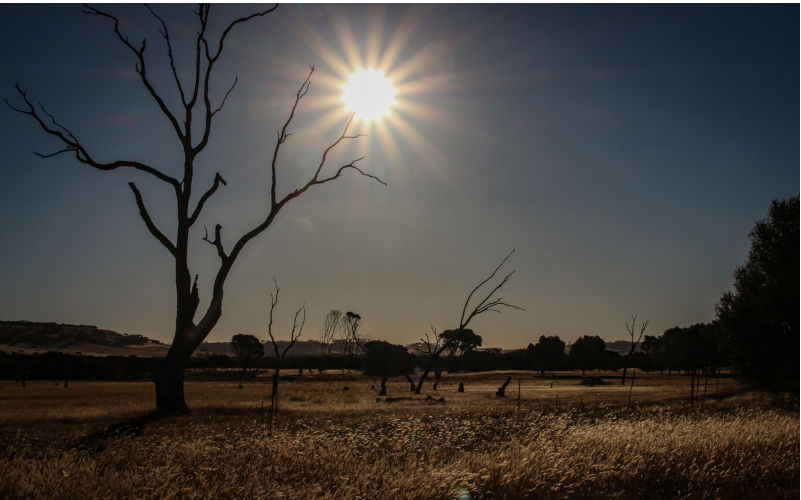Australia issues ‘terrifying’ climate warning
September 17, 2025
More intense global warming will bring “terrifying impacts” to human health, infrastructure, the environment, national security and the economy, the Australian Government has warned.
The First National Climate Risk Assessment summarises the threats to Australia — and, indeed every country on the planet — from a wild climate that is increasingly out of control.
Key findings include:
- No part of the country is immune from climate impacts;
- A hotter climate brings greater risks to all;
- Future changes may be sudden and large;
- Every small increase in temperature brings greater chances of multiple impacts, unleashing tipping points;
- Even small changes create feedbacks that make other factors worse; and
- Stabilising global warming will not prevent all climate impacts, some of which will persist for centuries.
The report identified more than 60 intensifying risks facing the nation in areas such as the economy, food security, defence, health, communities, infrastructure, the natural environment, Indigenous people and trade.
It said by 2050, all these risks would be rated “very high”. Risks to health and the environment were rated at the extreme end of “very severe”, while defence and community risks were “severe”.

Figure 1. Rising severity of climate risks to Australia. Source: Australian Government 2025.
The report stated that parts of the environment were already in danger of collapse, notably the ability of forests, wetlands and oceans to function as carbon sinks.
Importantly, too, it warned of rising food insecurity in Australia, a country endowed with a generous food surplus which feeds 60 million people worldwide. This will result from falling crop yields, rising heat stress for livestock, increasing loss of water for irrigation, declining output from forestry and fisheries and biosecurity threats.
While the report focuses mainly on the role of the Australian Defence Force in disaster prevention and relief, it also noted the scope for wider security impacts in the Indo-Pacific region and beyond, as more countries struggle to deal with unmanageable climate impacts.
Commenting on the government’s report, Admiral Chris Barrie, head of the Australian Security Leaders Climate Group, said: “It reveals a level of threat that now demands a fundamental shift in national planning, energy, and budget priorities.
“The NCRA paints a terrifying picture of climate impacts in a future Australia that will fundamentally change how and where Australians live and work, with even more severe storms and flooding, unbearable heatwaves and deeper droughts, and pressure on industry, infrastructure, agriculture and vulnerable communities.
“It is shocking that 1.5 million Australians will be at risk from sea level rise by 2050., and 597,000 will be at risk just five years from now. Parts of northern Australia will become unliveable, and it is likely that climate impacts will drive a permanent food cost-of-living crisis.”
While written exclusively for Australia, the Future Climate Report has profound implications for other nations, notably the US, where the Trump regime has implemented more than 140 policies designed to promote fossil fuels, gag government and university climate research and cripple the shift to clean energy. Deprived of the truth, in future citizens of counties like the US and Russia may have to rely on official warnings from countries like Australia, Germany, Sweden and New Zealand to cope with their own mounting domestic crises.
The report comes at an important time for Australia, whose successive LNP and Labor Governments have consistently placed the interest of oil and coal companies above those of the nation itself. It presents the Australian government with an acute dilemma – to side with its people or to side with foreign-owned fossil corporates.
According to the research think-tank the Australia Institute, the nation already spends more than $15 billion a year — equal to a quarter of its defence budget — on propping up largely foreign-owned coal and oil companies.
On top of this, the current Australian Government has approved more than six billion tonnes of new coal and gas emissions since taking office in 2022, making Australia the world’s third worst carbon export villain. It has 29 new fossil fuel projects in the approval pipeline.
Amid all this, Australia is currently competing with Türkiye to co-host the next United Nations Climate COP31 conference, due in November, with the support of the Pacific Island nations it is trying to drown with its energy policies.
For the past four years, the COP conference has been corrupted by dominant fossil fuel interests and it remains to be seen whether Australia is serious about fixing the climate – or merely acting as another stooge for planet-wide destruction.
The First National Climate Risk Assessment makes it clear that actions which promote the continued use of fossil fuels by Australia are inimical to the interests of its people and, indeed, to all citizens. It provides a test of political integrity at a time when the phrase has become almost meaningless.
At the least, it offers an honest appraisal of the consequences for Australia — and most other countries — of persistently ignoring one of the gravest perils of our age. An opportunity to change, and to side with humanity against the forces of greed and darkness that surround us.
The views expressed in this article may or may not reflect those of Pearls and Irritations.

